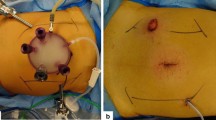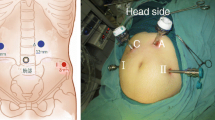Abstract
Background
Total mesorectal excision (TME) has greatly reduced the local recurrence rate of rectal cancer after colorectal surgery. Transanal TME (TaTME) is potentially a suitable option for patients with mid and low rectal cancer. Robotic systems overcome the limitations of laparoscopic surgery. The aim of this study was to investigate the safety and feasibility of robotic-assisted transanal total mesorectal excision (RTaTME) in patients with rectal cancer.
Methods
The clinical data of patients who underwent RTaTME for rectal cancer between May 2017 and January 2020 were reviewed. The perioperative data and short-term outcomes of all the patients were retrospectively analysed. Last follow-up was in May 2020.
Results
A total of 13 patients had RTaTME during the 36-month study period. The median docking time was 18 (IQR 16–20) minutes, median transanal phase time was 95 (IQR 74–100) minutes, median total operation time was 240 (IQR 195–270) minutes, median estimated blood loss was 60 (IQR 50–100) ml, the median number of lymph nodes retrieved was 15 (IQR 13–16) and median length of postoperative hospital stay was 7 (IQR 6–10) days. There was no mortality. Three (23%) patients suffered a postoperative complication including one anastomotic leak and one prolonged ileus, none of them required any intervention. Patients were followed up for a median of 15 (IQR 11–18) months, and no local tumour recurrences, metastasis or deaths were reported.
Conclusions
Our preliminary results suggest that RTaTME for rectal cancer is feasible. This innovative approach may offer patients potential benefits—further studies are needed




Similar content being viewed by others
References
Sylla P, Rattner DW, Delgado S, Lacy AM (2010) NOTES transanal rectal cancer resection using transanal endoscopic microsurgery and laparoscopic assistance. Surg Endosc Yea 24:1205–1210. https://doi.org/10.1007/s00464-010-0965-6(PMID: 20186432)
Adamina M, Buchs NC, Penna M, Hompes R (2010) St. Gallen consensus on safe implementation of transanal total mesorectal excision. Surg Endosc Yea 32:1091–1103. https://doi.org/10.1007/s00464-017-5990-2
Kang L, Wang J (2016) Current situation and outlook of transanal total mesorectum excision in rectal cancer. Zhonghua Wei Chang Wai Ke Za Zhi Yea 19:850–853 [PMID: 27545460]
de Angelis N, Portigliotti L, Azoulay D, Brunetti F (2015) Transanal total mesorectal excision for rectal cancer: a single center experience and systematic review of the literature. Langenbecks Arch Surg Yea 400:945–959. https://doi.org/10.1007/s00423-015-1350-7(PMID: 26497544)
Kuo LJ, Ngu JC, Tong YS, Chen CC (2017) Combined robotic transanal total mesorectal excision (R-taTME) and single-site plus one-port (R-SSPO) technique for ultra-low rectal surgery-initial experience with a new operation approach. Int J Colorectal Dis Yea 32:249–254. https://doi.org/10.1007/s00384-016-2686-3(PMID: 27744632)
Ragupathi M, Ramos-Valadez DI, Patel CB, Haas EM (2011) Robotic-assisted laparoscopic surgery for recurrent diverticulitis: experience in consecutive cases and a review of the literature. Surg Endosc Yea 25:199–206. https://doi.org/10.1007/s00464-010-1159-y(PMID: 20567850)
Lee L, de Lacy B, Gomez Ruiz M, Liberman AS, Albert MR, Monson JRT, Lacy A, Kim SH, Atallah SB (2019) A multicenter matched comparison of transanal and robotic total mesorectal excision for mid and low-rectal adenocarcinoma. Ann Surg Yea 270:1110–1116. https://doi.org/10.1097/SLA.0000000000002862(PMID: 29916871 'PMCID)
Jayne D, Pigazzi A, Marshall H, Croft J, Corrigan N, Copeland J, Quirke P, West N, Rautio T, Thomassen N, Tilney H, Gudgeon M, Bianchi PP, Edlin R, Hulme C, Brown J (2017) Effect of robotic-assisted vs conventional laparoscopic surgery on risk of conversion to open laparotomy among patients undergoing resection for rectal cancer: the ROLARR randomized clinical trial. JAMA Yea 318:1569–1580. https://doi.org/10.1001/jama.2017.7219(PMID: 29067426)
Park EJ, Baik SH (2016) Robotic surgery for colon and rectal cancer. Curr Oncol Rep Yea 18:5. https://doi.org/10.1007/s11912-015-0491-8(PMID: 26739822)
Xu J, Qin X (2016) Expert consensus on robotic surgery for colorectal cancer (2015 edition). Chin J Cancer Yea 35:23. https://doi.org/10.1186/s40880-016-0085-3(PMID: 26916742)
Blumetti J, Chaudhry V, Cintron JR, Park JJ, Marecik S, Harrison JL, Prasad LM, Abcarian H (2014) Management of anastomotic leak: lessons learned from a large colon and rectal surgery training program. World J Surg Yea 38:985–991. https://doi.org/10.1007/s00268-013-2340-y(PMID: 24305917)
Nagtegaal ID, van de Velde CJ, van der Worp E, Kapiteijn E, Quirke P, van Krieken JH (2002) Macroscopic evaluation of rectal cancer resection specimen: clinical significance of the pathologist in quality control. J Clin Oncol Yea 20:1729–1734. https://doi.org/10.1200/jco.2002.07.010(PMID: 11919228)
Ye J, Huang B, Tong W, Fu T, Li C, Wang X, Zhao S, Wang L, Shi L, Liu B (2015) Clinical analysis of 11 cases undergoing transanal minimal invasive or combined laparoscopy total mesorectal excision for rectal cancer. Zhonghua Wei Chang Wai Ke Za Zhi Yea 18:821–825 (PMID: 26303695)
Tuech JJ, Karoui M, Lelong B, De Chaisemartin C, Bridoux V, Manceau G, Delpero JR, Hanoun L, Michot F (2015) A step toward NOTES total mesorectal excision for rectal cancer: endoscopic transanal proctectomy. Ann Surg Yea 261:228–233. https://doi.org/10.1097/sla.0000000000000994(PMID: 25361216)
Fernandez-Hevia M, Delgado S, Castells A, Tasende M, Momblan D, del Diaz Gobbo G, DeLacy B, Balust J, Lacy AM (2015) Transanal total mesorectal excision in rectal cancer: short-term outcomes in comparison with laparoscopic surgery. Ann Surg Yea 261:221–227. https://doi.org/10.1097/sla.0000000000000865(PMID: 25185463)
Atallah S, Martin-Perez B, Pinan J, Quinteros F, Schoonyoung H, Albert M, Larach S (2014) Robotic transanal total mesorectal excision: a pilot study. Tech Coloproctol Yea 18:1047–1053. https://doi.org/10.1007/s10151-014-1181-5(PMID: 24957360)
Chouillard E, Chahine E, Khoury G, Vinson-Bonnet B, Gumbs A, Azoulay D, Abdalla E (2014) NOTES total mesorectal excision (TME) for patients with rectal neoplasia: a preliminary experience. Surg Endosc Yea 28:3150–3157. https://doi.org/10.1007/s00464-014-3573-z(PMID: 24879139)
Arroyave MC, DeLacy FB, Lacy AM (2017) Transanal total mesorectal excision (TaTME) for rectal cancer: step by step description of the surgical technique for a two-teams approach. Eur J Surg Oncol Yea 43:502–505. https://doi.org/10.1016/j.ejso.2016.10.024(PMID: 27914773)
Penna M, Hompes R, Arnold S, Wynn G, Austin R, Warusavitarne J, Moran B, Hanna GB, Mortensen NJ, Tekkis PP (2019) Transanal Total Mesorectal Excision: International Registry Results of the First 720 Cases. Ann Surg Yea 266:111–117. https://doi.org/10.1097/sla.0000000000001948(PMID: 27735827)
Atallah S, Nassif G, Polavarapu H, deBeche-Adams T, Ouyang J, Albert M, Larach S (2013) Robotic-assisted transanal surgery for total mesorectal excision (RATS-TME): a description of a novel surgical approach with video demonstration. Tech Coloproctol Yea 17:441–447. https://doi.org/10.1007/s10151-013-1039-2(PMID: 23801366)
Atallah S, Martin-Perez B, Parra-Davila E, deBeche-Adams T, Nassif G, Albert M, Larach S (2015) Robotic transanal surgery for local excision of rectal neoplasia, transanal total mesorectal excision, and repair of complex fistulae: clinical experience with the first 18 cases at a single institution. Tech Coloproctol Yea 19:401–410. https://doi.org/10.1007/s10151-015-1283-8(PMID: 25708682)
Gomez Ruiz M, Palazuelos CM, Martin Parra JI, Alonso Martin J, Cagigas Fernandez C, del Castillo Diego J, Gomez Fleitas M (2014) New technique of transanal proctectomy with completely robotic total mesorrectal excision for rectal cancer. Cir Esp Yea 92:356–361. https://doi.org/10.1016/j.ciresp.2013.12.007(PMID: 24589418)
Ye J, Tian Y, Wang L, Ye Y, Zhang Y, Li F, Liu B, Tong W (2017) Robotic-assisted transanal total mesorectal excision for lower rectal cancer. Zhonghua Wei Chang Wai Ke Za Zhi Yea 20:900–903 [PMID: 28836251]
Wasmuth HH, Faerden AE, Myklebust TÅ, Pfeffer F, Norderval S et al (2019) Transanal total mesorectal excision for rectal cancer has been suspended in Norway. Br J Surg. https://doi.org/10.1002/bjs.11459
Sylla P, Knol JJ, D’Andrea AP, Perez RO, Atallah SB, Penna M, Fingerhut A (2019) Urethral injury and other urologic injuries during transanal total mesorectal excision. Ann Surg. https://doi.org/10.1097/sla.0000000000003597
Atallah S, Hodges A, Larach SW (2018) Direct target NOTES: prospective applications for next generation robotic platforms [J]. Tech Coloproctol 22:363–371. https://doi.org/10.1007/s10151-018-1788-z
Funding
Supported by the National Natural Science Foundation of China (81570483, and 81770541), and a clinical innovation project of Army Medical University (2014YLC04; 2019CXLCB004).
Author information
Authors and Affiliations
Corresponding author
Ethics declarations
Conflict-of-interest
All authors declare no conflicts-of-interest related to this article.
Ethics approval
This retrospective review study involving human participants was in accordance with the ethical standards of the institutional and national research committee and with the 1964 Helsinki Declaration and its later amendments or comparable ethical standards. The Ethics Committee of Daping Hospital approved this study.
Consent to participate
Informed consent was obtained from all individual participants included in the study.
Consent for publication
Written informed consent for publication was obtained from all participants.
Additional information
Publisher's Note
Springer Nature remains neutral with regard to jurisdictional claims in published maps and institutional affiliations.
Rights and permissions
About this article
Cite this article
Ye, J., Shen, H., Li, F. et al. Robotic-assisted transanal total mesorectal excision for rectal cancer: technique and results from a single institution. Tech Coloproctol 25, 693–700 (2021). https://doi.org/10.1007/s10151-020-02337-z
Received:
Accepted:
Published:
Issue Date:
DOI: https://doi.org/10.1007/s10151-020-02337-z




